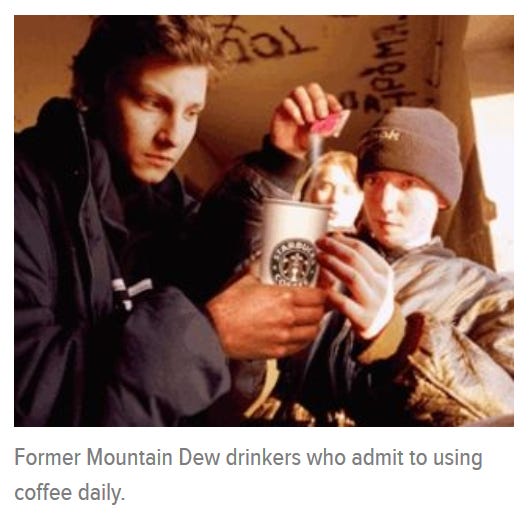Reviewing The Onion from 20 years ago: April 26, 2000
Remember Elián Gonzalez? That was 20 years ago! We also get Mountain Dew addiction, pole-vaulting Bill Clinton and a call for more father-son mind-transfer comedies
Welcome back to The Onion: 20 Years Later. Today, we’re looking at Vol. 36, Issue 15, from exactly 20 years ago: April 26, 2000.
A special hello to new subscribers, and a big thank you for co-workers and other folks who are saying nice things about this newsletter. It’s a joy to put together and I hope it’s providing some fun.
Please share with anyone who loves The Onion or needs something that’s not #coronavirus to read.
Have thoughts? Something I missed? Send me an email or @ me.
And if you’re new, please sign up below. One weekly fun email, no cost, no demands.
What issue is this?
This is the 14th published Onion issue of the 2000s, even though it says issue 15 (The Onion skipped March 29, 2000). The photo above is from The Onion’s website in 2000 as preserved by The Wayback Machine. Here is the website in 2010 and in 2020.
What was the top story, and other impressions?
This issue has grown on me as I’ve been writing this email. The stories aren’t timeless classics, but there’s a nice mix of local news, commentary and silliness that’s on brand for The Onion.
This is the Elián Gonzalez issue of The Onion, even though neither Elián-related item was the lead story in print or on the 2000 or 2010 website layouts.
The April 22 raid, of course, was the culmination of months of escalating tensions, court battles and media coverage. I don’t remember the saga very well, although I’ve been re-reading some of the coverage in recent weeks while putting together this newsletter.
Anyways, The Onion was ready with two features. This timely coverage alone is noteworthy — The Onion had been weeks late or ignored several news events in 2000, including the Microsoft antitrust case (although its Monopoly monopoly coverage made up for that).
First, The Onion highlights Elián’s last full day in the US with an infographic of his schedule. It’s a real grab-bag of jokes:
The stupid “Weekend Update”-style jokes might be the best, perhaps because they cut through the tension of the situation. I mean, “Anti-Castr-O’s” is very silly and made me laugh!
I felt other jokes weren’t as funny but were at least deliberately stupid and blunt in their messaging: the American flag being Elián’s blanket, Dehumanized Political Symbol magazine, the title of his essay, etc.
The other Onion story to touch on Elián is “Federal Troops Seize Neglected Child In Pre-Dawn Raid.” Here, HHS Secretary Donna Shalala orders a raid to rescue a neglected child. There’s not much of a joke besides “What if we did this for every child?” but it’s a short article that makes its point and gets out.
The Easter egg of this story is using Shalala as the protagonist. She was once chancellor of the University of Wisconsin system, and The Onion in 2000 was still in Madison, Wis. During the 1990s, in particular, Shalala was a common Onion target, sometimes in a cruel way.
Little windows into American life
One of my favorite aspects of The Onion’s classic era was its insistence on being a parody of a local newspaper, not just a parody of real-life news. This issue is not the most hilarious one I’ve reviewed, but there’s a healthy dose of small-town reporting and “we all know someone like that” commentary. Here are a few examples:
“Pyramid Scheme 'Not A Pyramid Scheme’” is short and silly, with the most notable aspect being The Onion referring to an email as “electronically dispatched literature.”
“Boyfriend Vows To Try Harder” and “Country Singer Trying To Think Of Rhyme For 'Shove You’” are promising headlines but don’t have much else going for them.
“Teen Male Vaguely Unnerved By Nude Pantyhose Rack At Kmart” is fine, but I don’t know how believable it is for a 13-year-old boy to say to his brother something like “I don't know what it was about it, but it was just sorta unsettling." I only have a sample size of me and my brother, however.
“Area Woman Offended For Fourth Time In One Day” kicks off with a homemaker being upset by a telemarketer, which is both understandable and a very 1980s setup. Here, The Onion and its reporters are tracking things no one ever would think of, like the daily record for taking offense:
Fowles' mark of four falls short of the all-time Boston-area single-day offense-taking record of seven, set by Somerville secretary Florence Bullock in 1981.
I have to say that I’m on Irene Fowles’ side here. She has legitimate grievances against telemarketers, people with pro-Charles Manson views, getting cut in line by a man at the bank, and a friend neglecting a promise.
Fake special interest groups
As regular readers know, I love when The Onion makes up trade associations and lobbying groups. This week, we have a few:
In the above story about Irene Fowles being offended, there’s “the Dallas-based courtesy-advocacy group Of All The Incredible Nerve.”
“Dave Stenulson Calls For Greater Recognition Of Stenulson-Americans” is an entire article about the efforts of the National Association For The Advancement Of Stenulson-Americans.
The excellent “Mountain Dew Users May Go On To Use Harder Beverages,” which I discuss farther down, features “Think Before You Drink, a New York-based soft-drink-industry watchdog group.”
“He was quiet and kept to himself” edition
“Neighbors Believed Murderer Only Capable Of Rape” is really walking a tightrope. It’s not sensitive writing, and I’d caution some folks about clicking through on the link, but what the article 100% gets right is how news stories about murderers always quote clueless neighbors, friends and family. They always are surprised and trying to justify their lack of perception.
I edit news for a living, so I especially appreciate how accurate The Onion’s opening paragraph parodies real news stories:
BEDFORD, VA–John Smith's April 25 murder of local teens Amy and Emily Dutler has sent shockwaves through this tight-knit community in the foothills of the Blue Ridge Mountains, its 6,000 residents struggling to comprehend how the man was capable of a crime so severe.
All the tropes are there: The big-city reporter calling a small place “tight-knit,” only discussing the town in proximity to a geographical feature, acting as if every resident has the same exact thoughts and mindset, and so on.
Were the infographics good?
As I mentioned, the Elián infographic has many jokes, and some of them work. I say this almost every week: Make the infographics and lists longer!
Also featured was “Top Words Causing Giggles Among Pre-Teens,” which I’m declaring a winner because I stopped being a pre-teen in 1996 and still laughed at these.
The percentages add up to 100, by the way. I love the idea of asking pre-teens, “Pick one, and only one.”
The only word that surprised me was “slot,” and that’s probably because I started my career as a newspaper copy editor, where the “slot” was a common term, explained briefly here by the late Bill Walsh.
What real-life events/people were mentioned?
Elián Gonzalez. Donna Shalala. Bill Clinton. Surgeon General David Satcher. Leeza Gibbons. World Bank/IMF protests. Kirk Cameron. Judge Reinhold. Fred Savage. George Burns. Charlie Schlatter. Jodie Foster. Barbara Harris. Joseph Campbell. William Randolph Hearst.
Leeza Gibbons of the talk show “Leeza” is mentioned briefly in “Area Woman Offended For Fourth Time In One Day.” Poor Leeza’s show was off the air less than 5 months later.
All the actors and Joseph Campbell are in “Why Haven't There Been Any Good Father-Son Mind-Transfer Comedies Lately?” which I discuss a little farther down.
The World Bank and IMF met in April 2000 in Washington, D.C., amid large protests, and so The Onion asks people on the street what they think in “Third World Debt Relief.” I am partial to the opinion expressed by systems analyst Fred Singletary:
"I agree with the EMF protesters. The musical atrocities committed by this early-'90s British dance-rock quintet are truly unbelievable."
Then-Surgeon General David Satcher is featured in the delightful “Mountain Dew Users May Go On To Use Harder Beverages,” as he has released a report calling the soda a starting point for “hardcore beverage use” and utters the amazing sentence “There are children as young as 10 in this country who regularly do the Dew.”
This is The Onion parodying anti-drug campaigns that were huge in the 1990s (as it did with Jan. 26’s “Teen Drug Use Traced To Ineffective PSAs”), and that’s important to note in understanding the context of this article. But I would laugh at this piece even if I knew none of that. It goes beyond just a simple drug parody and targets that dastardly villain coffee, also known as “Water Joe”:
"Everyone is familiar with the frightening image of the trembling, barely functional coffee addict, unable to face the world without his morning fix," Hurst said. "But few people think about the beverages that coffee junkie started out on before working his way up to that pathetic state."
Also, I love this ridiculous quote about the Dew’s origins:
"Mountain Dew came into vogue in the late '70s as a performance-enhancing beverage, consumed by young people seeking to prolong their enjoyment of such activities as horseback riding and rope-swinging over swimming holes," Hurst said.
Most “Hey, it’s 2000!” reference
Everything Elián Gonzalez, obviously, but that’s too easy. I’m going to go with almost all of “Area Woman Offended For Fourth Time In One Day,” but in particular the phrase “a telemarketer who called during the dinner hour.”
Was Bill Clinton mentioned? Was an animal quoted?
No anthropomorphized animals, but two doses of Clinton. He is mentioned in the Elián infographic as being a boring lunch host, and he gets yet another entry in what I’ve called “The Onion’s fascination with ‘1980s-style action hero’ President Bill Clinton.”
This time, it’s the terribly Photoshopped “Clinton Becomes First President To Clear 18 Feet In Pole Vault”:
What columnists ran?
Onion publisher emeritus T. Herman Zweibel might be 132 years old and raising a 7-foot-tall Frankenstein’s monster child, but he never misses a writing deadline.
Last week, his son left manservant Standish seemingly for dead, but Standish is alive and well in this week’s “I Like This 'T-Shirt' Fashion.”
Zweibel finds out about T-shirts when he notices all the other children are not wearing “a velvet Little Lord Fauntleroy suit and knee-stockings.” And he has Standish procure one, offering his design preference:
"I would like a 'T-shirt' of my own. Go to the village T-shirtery and obtain one for me. I favor one that states, 'William Randolph Hearst Is A Lascivious Vulgarian, And You Mustn't Buy One Of His Cheap, Tawdry Scandal-Sheets, Even If Your Very Well-Being Depended Upon It.'"
That does not pan out, but Zweibel does get an "Official Bikini Inspector” T-shirt. A source close to this newsletter suggested this shirt should have been “Female Body Inspector.” I agree that the latter phrase is more commonly known, but a Google Shopping search for “Official Bikini Inspector” reveals a distressingly large selection.
One joy of this newsletter is discovering stories I was unaware of, and “Why Haven't There Been Any Good Father-Son Mind-Transfer Comedies Lately?” is one of those. I like it more every time I read it.
Look, Walter Lolich has a point: We’re missing a golden opportunity in not making mind-swap movies between fathers and sons, especially after the success of late 1980s films “Like Father, Like Son,” “Vice Versa” and “18 Again!” I honest to God love both of Lolich’s suggested plots:
What if, for example, the dad were a drill sergeant and the kid a slacker goof-off? The dad's platoon could end up winning the big boot-camp showdown because "Sarge" taught them how to cheat. Meanwhile, the kid's band becomes a hit because the "son" made them practice, practice, practice!
…
Or suppose the dad's a hotshot lawyer, and the son's a goof-off party animal whose law-school admissions exam is just days away? They swap bodies, and the son figures he's got it made, since his dad will be the one taking the test. But then they get switched back just hours before the exam!
Please, Hollywood, after the quarantines end, make a movie called “Body-Swappin'.“
(Side note: Weirdly, The Onion featured columns by Walter Lolich for three consecutive weeks in April 2000 and then never again.)
Finally, we have Onion regular townie Jim Anchower, who I’ve been pleasantly surprised by. He writes this week with a warning: “Keep An Eye Out For Pigs!” First, we get yet another update on Anchower’s changing job status, and we live through the tension as he gets pulled over for speeding with a “bag of weed I had in my pocket.”
All ends well enough with the cops, but there is a casualty:
When I finally got to Wes' place, I discovered that the weed, which was packed in some baggie that let moisture in and out, was all soaked with sweat. I had to dry it out in the microwave before we could smoke it, and even then, it tasted funny. It did the job, though.
We end with some ruminations and car jokes as Anchower prepares “to dust off the old court shirt.”
What was the best horoscope?
The Onion is oft-talked about for its prophecies, such as predicting the five-blade razor, and this week’s Capricorn is way ahead on the online dating game.
Capricorn | Dec. 22 to Jan. 19
You meet your online romance, only to find he's no more exciting than you are.
What holds up best?
The idea of “Pyramid Scheme 'Not A Pyramid Scheme’” never goes out of style, even if the article is a letdown.
I haven’t discussed this infographic with parents of pre-teens, but I hope they show their children “Top Words Causing Giggles Among Pre-Teens” and chart the reactions. Or maybe that’s a bad idea. I’m not a parent, what do I know?
What holds up worst?
Most of the stuff that’s dated is pretty innocuous, unless I’ve forgotten something as I wrote this. I would say “Ammonia-Factory Leak Exposes Texas Town To Mexican Working Conditions” ages most poorly, especially because the joke writing isn’t that great. Separately, as someone who once covered the chemical industry, US facilities (or at least the negligent ones) are plenty capable of lousy working conditions.
What would be done differently today?
The use of “Third World” in the World Bank/IMF item threw me off, but the New York Times was using it on its front page in April 2000, so I guess we hadn’t moved on to “developing world” or other phrases.
I imagine, of course, that a lot of these stories would be supplanted by coronavirus coverage if that had happened 20 years ago.
What was happening in the real world?
The Onion published April 26, but printing a newspaper requires an earlier deadline. Therefore, here are news items from April 17-23, 2000, as listed by InfoPlease and the front pages of The New York Times (subscription required):
U.S. raid succeeds in reuniting Elián Gonzalez with his father. People worry about dot-com stocks. Protests greet IMF, World Bank meetings. United Nations Commission on Human Rights won’t criticize China on human rights. Gephardt opposes China trade normalization bill. “Online Therapy: An Arm's-Length Approach.” Two high-fiber studies fail to uncover colon benefits. Fossilized heart of dinosaur reportedly found. Boston Marathon ends with closest men’s finish. Boeing 737 crashes in the Philippines. Miranda decision revisited in Supreme Court. Former Louisiana governor on trial for racketeering. Geneticists say boy who died in 1795 was Marie Antoinette’s son. 15-year-old arrested for cyberattack on CNN website. Regulators look at Web’s role in political campaigning. Russian legislators approve arms-reduction accord. UN tries to manage East Timor. Old-line conservatives stay mum on Bush. “In Japan, Start-Up and Risk Are New Business Watchwords.”








